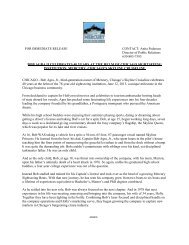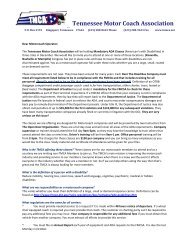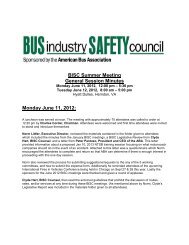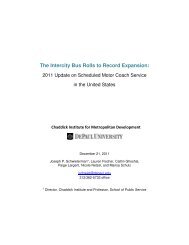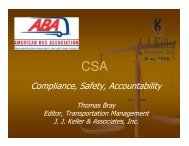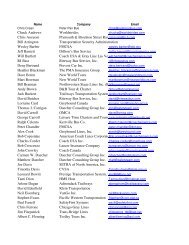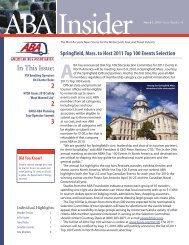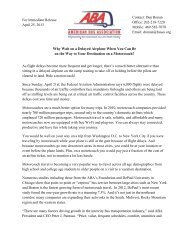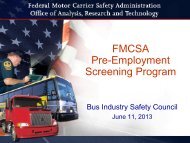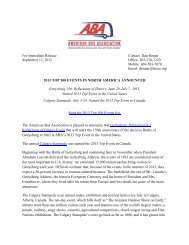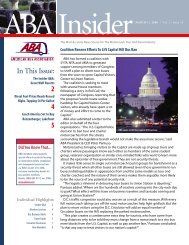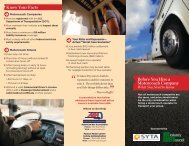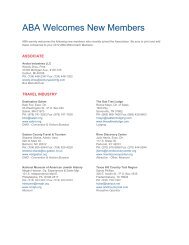Media Relations & Marketing Handbook - American Bus Association
Media Relations & Marketing Handbook - American Bus Association
Media Relations & Marketing Handbook - American Bus Association
Create successful ePaper yourself
Turn your PDF publications into a flip-book with our unique Google optimized e-Paper software.
<strong>American</strong> <strong>Bus</strong> <strong>Association</strong><br />
<strong>Media</strong> <strong>Relations</strong><br />
& <strong>Marketing</strong><br />
<strong>Handbook</strong><br />
Tools, Tips & Tactics To Earn Positive<br />
Press, Create Compelling Consumer<br />
Campaigns, & Boost Your <strong>Bus</strong>iness –<br />
Without Spending More Time & Money.
TABLE OF CONTENTS<br />
<strong>Media</strong> <strong>Relations</strong> Tips- Critical “do’s and don’ts” to follow in any media<br />
interview. PP. 2-4<br />
Crisis Communications- How to deal with, contain, and navigate worst case<br />
scenarios. P. 5<br />
Sample Op-Eds- Op-ed is short for “opinion-editorial,” and are usually 750-<br />
word guest columns on key issues. PP. 6-7<br />
Sample Letters To The Editor- Short responses to editorials, columns or<br />
news stories to correct the record – never exceeding 250 words. PP. 8-9<br />
Sample Press Releases- Examples of how to generate news coverage for<br />
your business PP. 10-11<br />
Ad Comps- Examples of several customizable ads touting motorcoach attributes<br />
and benefits of group travel. PP. 12-17<br />
<strong>Media</strong> Contact Lists- Target specific outreach contact information for print,<br />
radio, TV, & web, categorized by issue areas: Trade <strong>Media</strong>, Safety, Environment,<br />
Transportation <strong>Bus</strong>iness, Inside the Beltway, and Canada. PP. 18-23<br />
<strong>Marketing</strong> Messages- When to use “bus” versus when to use “motorcoach”;<br />
Tips on how to distinguish ourselves from other travel modes. PP. 24-25<br />
Motorcoach Photos- 20 photos from four of our leading coach manufacturers.<br />
P. 26<br />
Destination Photos- 13 photos of iconic destinations and attractions and<br />
events. P. 27<br />
Logos- Pro-bus street signs and ABA logos. P. 28<br />
1
MEDIA RELATIONS TIPS<br />
Do’s & Don’ts When Dealing With The <strong>Media</strong><br />
• Do Prepare. If you’re prepared, you’re comfortable. If you’re comfortable, you’re in control. The<br />
more you know, the less chance you’ll stumble and say something you shouldn’t. You must be ready for<br />
anything. You can’t assume you know what a reporter will ask. Practice answering “gotchya” questions<br />
the media might try to use to trap you.<br />
• Do Control The Situation. If a reporter calls you with questions, don’t feel compelled to answer<br />
on the spot. Find out his or her deadline, and say you’ll call back. Interview the reporter. What’s the story<br />
about? Who’s been interviewed so far? What have they said? If the reporter won’t be specific, say, “This<br />
is an awfully broad topic, and we could talk all day about it. But you’re on deadline, and I want to respect<br />
that. Could you give me some specific?”<br />
• Do Your Homework. Always respect reporters’ deadlines. Research their past articles. See if any<br />
of your colleagues have any experience dealing with the reporter. If they’re coming with a camera crew<br />
tomorrow, watch the news broadcast tonight to get a feel for their style.<br />
• Do Stay on Message. Envision the ideal headline for the story from your perspective. If a reporter<br />
asks a negative question, turn it around. Your mission is to deliver your message to your key audiences,<br />
not to please the interviewer:<br />
“That’s a good question, but what I think you’re really asking is …”<br />
“That’s an excellent question, but before we get into that …”<br />
Reporters will often try to get you to say things you don’t want to say. Stick to your key points, and repeat<br />
them again and again, no matter what the question. You are using the media as a conduit to get your<br />
message delivered.<br />
• Do Localize & Humanize The Story. Stories about mom-and-pop small businesses humanize<br />
the motorcoach, tour and travel industry as a community, and help to distinguish ours from the “Big<br />
Corporate” industries that characterize most other transportation sectors.<br />
2
MEDIA RELATIONS TIPS<br />
• Do Use ABA’s Customized <strong>Media</strong> Lists. These lists were carefully created and culled to make<br />
your job easier by pitching to the right folks. From trade media to business, environment to safety, and<br />
Marketplace to Top 100, they are a precision targeting tool for getting your stories to the right reporters.<br />
• Do Use ABA’s Deskside Assistance. ABA’s Communications department has 20 years of<br />
experience in media relations from all sides of the situational dynamic. Reporter, columnist, editor,<br />
strategic messaging counselor, Congressional press secretary – ABA’s had experience in each role. Tap<br />
into ABA as a resource to use to your advantage, including at a moment’s notice if necessary. Because<br />
if an outlaw operator crashes a bus in the vicinity of your operational facility, the media may show up<br />
unexpectedly to get “an operator’s reaction.” And “it wasn’t my bus” is never the right answer, even if it’s<br />
the correct one!<br />
• Do Smile. How you say something is as important as what you say. Studies show that<br />
communication is 8 percent words, 42 percent voice qualities (tone, pitch, cadence), and 50 percent nonverbal<br />
cues – gestures, clothing, posture, grooming, facial expressions.<br />
• Do Be A <strong>Media</strong> Resource. By providing a service to journalists, you can establish a positive<br />
relationship. Reporters are always looking for something new and compelling. They will remember who<br />
helped them. <strong>Media</strong> relationships are a process, not an event. Building ties when you don’t need a story<br />
increases your chances of getting coverage when you are.<br />
• Do Have News. Choose important stories to pitch. Send out too much material and they will ignore<br />
all of it. Don’t waste reporters’ time. You’ll quickly lose credibility and goodwill.<br />
• Do Manage Expectations. Hold events early in the day, before reporters get hooked on other news.<br />
Avoid Mondays and Fridays. Mondays are tough for everyone. Avoid Fridays because Saturday is the<br />
lowest media readership and viewership day of the week. Notice how politicians always announce bad<br />
news on Fridays, hoping it will get lost over the weekend.<br />
3
MEDIA RELATIONS TIPS<br />
• Don’t Believe That The <strong>Media</strong> Are In Control. Yes, they do decide which sound bites are aired,<br />
and which quotes are printed. But you control vital aspects of your relationship with the media because<br />
they need you as a source as much as you need them as a conduit to your key audiences.<br />
• Don’t Lie. The smallest half-truth will inevitably be revealed. Even if you tell a reporter the<br />
truth 9 out of 10 times, your credibility will be severely damaged by one fib or sin of omission. Lose your<br />
credibility with the press and it’s all over.<br />
• Don’t Believe “Off The Record.” Assume everything is on the record. Don’t say anything you<br />
don’t want to see in print, posted on the internet, heard on the radio, or seen on TV.<br />
• Don’t Lose Your Cool. Relax and be friendly. Speak with confidence and authority, projecting an<br />
attitude of enthusiasm even if you don’t feel like it. It’s a conversation, not an interrogation. If the reporter<br />
senses you are uncomfortable, he’ll assume you are hiding something. Even if ambushed, don’t ever act<br />
surprised. Don’t let them intimidate you. If the reporter is hostile, don’t match his tone or attack him.<br />
Thank the reporter for asking any question, no matter hostility. Diffuse hostile questions instead with:<br />
“Thank you for asking. I’m pleased to have the opportunity to address this.”<br />
“I appreciate your asking that.”<br />
Then launch into the messages you want to deliver. Remember, no one ever sees the questions you are<br />
asked, only your answers.<br />
• Don’t Ramble. Answer succinctly and to the point. Say only what you need to say. The more<br />
you say, the greater likelihood you’ll get into trouble. Don’t ramble, guess or speculate. They can’t quote<br />
you on what you don’t say. Even if they hold the microphone in front of you after you’ve answered<br />
the question, don’t feel compelled to amplify on the question you’ve already answered. This is an old<br />
reporter’s trick – they know the silence of the microphone in front of you is unnerving, and they want to<br />
goad you into saying something you shouldn’t.<br />
• Don’t Say “No Comment.” Saying “no comment” sends a message that you are hiding<br />
something. If you don’t know the answer to a question, say so, and offer to get back to the reporter. Then<br />
find the answer later and follow up.<br />
4
CRISIS COMMUNICATIONS<br />
Crisis communications is something everyone hopes to avoid. But chances are good you’ll find yourself at<br />
the epicenter of such a situation at some point during your professional career. You can’t ever predict when it<br />
will occur – and that is what defines it as a crisis.<br />
But you are not helpless to how events that may be beyond your control will ultimately unfold. You can<br />
prepare for a crisis, and be ready when the unpredictable event strikes. The secret to effective crisis communications<br />
is establishing company protocols before a crisis catches you off guard. Doing so in advance will help<br />
to mitigate its possible damaging effects.<br />
So think not of what you plan to do after, for example, H1N1 hysteria leads to mass cancellation of school<br />
charter trips aboard your coaches. Or a bus crash by a rogue operator without federal operating authority occurs<br />
as the unlicensed driver coincidentally careens into an embankment in close proximity to your facility.<br />
Think rather about what you plan to do before such an event occurs. Doing so will increase your comfort level<br />
at the most discomforting of times – such as when the sweat-inducing camera lights blaze on and the reporter<br />
looking for a “gotchya” interview shoves a fuzzy microphone in your face when you open your facility’s front<br />
door.<br />
No one can predict the course of the H1N1 virus spreading, and its potential effect on travel. Or a rogue operator<br />
bus crash that threatens to besmirch the reputation of the industry with the safest record among surface<br />
transportation options. But you can have safeguards in place to be prepared if a crisis situation breaks, and a<br />
media frenzy ensues. Here are tools you can implement – via company policy manuals, practice exercises, and<br />
crisis drills – to be ready.<br />
Establish clear communications channels beforehand. Unforeseen emergencies are, by their inherent nature,<br />
chaotic. But your first role in any crisis scenario is to ensure you get as much reliable information on the<br />
situation as quickly as possible.<br />
Know who will be the voice and face of your company. Decide now that a pre-determined companydesignated<br />
spokesperson will be the only voice representing your company with the media, law enforcement<br />
officials, federal or state agencies, and the public. The company president & CEO is often the best choice, as s/<br />
he ideally brings gravitas, solemnity, poise and a sense of control to the chaos, exuding an air of authority that<br />
instills confidence among the public – and your customers.<br />
Practice your messages beforehand and stick to them. Determine what your key messages will be, script<br />
them, memorize them, and practice them. Most important, keep them simple.<br />
Strive to regain control of the situation. In any crisis communications situation, regaining the offensive<br />
must be integrated into every action you take. You ultimately must reposition your company from a reactive<br />
stance, where events are driving your responses, to one of reclaiming control over the situation, where your actions<br />
are driving the swift resolution and containment of the fallout from what has happened.<br />
Transparency is credibility. You must at all times be open, forthright, and candid. Make sure you are<br />
conveying accurate and reliable information. Doing so will build goodwill and help ease crisis tensions, thus<br />
solidifying your credibility.<br />
Detail the corrective actions you’re taking. Compile a detailed list of everything you’re doing to rectify the<br />
situation, step-by-step, action by action. Don’t blame, speculate or refuse to comment. Any or all of the three<br />
will only make things worse. Remember the media relations maxim, “If you fight it, you ignite it.”<br />
Run everything by your legal counsel. This is where those billable hours are worth every penny and then<br />
some. Ensure your attorney reviews everything you plan to say, do, release, or share with anyone outside the<br />
company for your own legal protection.<br />
Remember, this too shall pass. Although the first stages of a burgeoning crisis may seem like an eternity, it<br />
won’t last. That is, providing you take these steps to contain it.<br />
5
SAMPLE OP-EDs<br />
[Your Company Logo Here]<br />
Motorcoaches Are The 17-Cent Solution<br />
[By Your Name Here]<br />
The current 17-cents-per-gallon partial federal fuel tax exemption for motorcoaches allows bus operators<br />
to fill in mobility gaps across the country. It helps us to provide bus service that links to other intermodal<br />
transportation connections. It pays priceless societal dividends by removing cars from the road, reducing energy<br />
consumption, and slashing carbon dioxide emissions.<br />
Each full motorcoach has the potential of removing 55 autos from the highway. Motorcoaches provide 206.6<br />
passenger miles per gallon (MPG), the highest among all modes of transportation. Commuter rail gets 92.4<br />
passenger MPG, transit buses achieve 31.4 passenger MPG, domestic air carriers achieve 44 passenger MPG,<br />
personal automobiles averaged 27.2 passenger MPG, and hybrid cars 46 passenger MPG.<br />
For more than 14 million rural U.S. residents, motorcoaches are the only available mode of public intercity<br />
transportation service, going where air and rail do not. There are five times as many motorcoach terminals<br />
nationwide as there are airports, and six times as many bus terminals as there are intercity rail terminals.<br />
Persons who are mobility-impaired rely on motorcoaches for accessible transportation. Students and seniors<br />
use motorcoaches for educational trips, sports outings, and travel to cultural and historical destinations. And<br />
business executives use motorcoaches to commute.<br />
No wonder motorcoaches account for 751 million passenger trips annually, moving more people than the<br />
airlines do in some years and moving more people in two weeks than Amtrak does all year. Better yet, given<br />
how motorcoaches infuse tourism dollars into everywhere they go, every state is a bus state. One motorcoach<br />
spending one night at a destination generates as much as $11,660 for that local economy in meals, lodging, and<br />
other spending.<br />
Motorcoach traveler and tourist demand generates more than $55 billion annually in economic transactions.<br />
The demand for goods and services created by motorcoach travel, combined with new motorcoach sales and<br />
industry equipment purchases, generates employment for 792,700 people.<br />
With many seeking answers on how to solve America’s 21st century transportation needs the bus industry is<br />
available today as the cost-effective answer – ready to go anywhere there’s pavement, and still the most costefficient<br />
way to provide mobility to those most in need.<br />
Motorcoaches provide that cost-effective mobility to millions of <strong>American</strong>s at virtually no cost to taxpayers,<br />
while other transportation sectors receive billions in annual federal subsidies. Motorcoaches account for a mere<br />
6 cents in federal subsidies per passenger trip, while public transits cost taxpayers 77 cents per passenger trip,<br />
commercial air carriers cost taxpayers $4.32 per passenger trip, and Amtrak costs taxpayers $46.06 in taxpayer<br />
subsidies per passenger trip. The 17-cents-per-gallon fuel tax exemption is an investment that’s a bargain by any<br />
measure.<br />
The partial fuel-tax exemption is an investment in moving America. Motorcoaches are the travel solution<br />
available today. A dime, a nickel and two pennies are an investment with far greater return in total benefits to<br />
society. The motorcoach fuel tax partial-waiver investment is 17 cents of common sense.<br />
6
SAMPLE OP-EDs<br />
[Your Company Logo Here]<br />
Motorcoach Travel Is The Greenest<br />
[By Your Name Here]<br />
When you travel by motorcoach, you’re choosing the greenest option. Don’t take my word for it. Listen to the<br />
scientific and academic authorities.<br />
The Union of Concerned Scientists, recently released a report entitled: “Getting There Greener: The Guide<br />
To Your Lower Carbon Vacation.” Their scientific conclusion: go by bus to go green.<br />
“A couple traveling on a motorcoach will generate nearly 50 percent less global warming pollution than they<br />
would driving a hybrid car,” the study found. [YOUR COMPANY NAME HERE] couldn’t have said it better<br />
ourselves. Couple that scientific study with the updated DePaul University study showing how more bus travel<br />
cuts carbon dioxide, and science and academia have spoken eloquently:<br />
“The growth of new bus operators … over the past year has reduced the carbon dioxide emissions by an<br />
estimated 36,000 tons,” the DePaul study by Dr. Joseph P. Schwieterman found. “These estimates are based on<br />
the proportional shift in travel from less fuel efficient modes to more fuel-efficient modes of transportation.”<br />
[YOUR COMPANY NAME HERE] saying that motorcoaches are green and cost-effective; now, the<br />
academic and scientific communities have begun to carry the message for us — both to policy-makers and the<br />
media — after doing the research themselves.<br />
Motorcoaches lead every other travel mode in terms of fuel efficiency on a per-passenger basis, averaging<br />
more than 200 passenger miles per gallon, according to a 2008 study by MJ Bradley & Associates. The<br />
study, “Updated Comparison of Energy Use & Emissions from Different Transportation Modes,” shows that<br />
motorcoaches offer a whopping 206.6 passenger mpg, the highest of 14 modes studied.<br />
Among the 14 modes studied, personal automobiles averaged 27.2 passenger mpg, SUVs 15 passenger mpg<br />
and hybrid cars 46 passenger mpg. Independent bus operators, who provide more than 751 million passenger<br />
trips annually, continue to be the greenest way to go, with virtually no federal subsidy. The motorcoach industry<br />
continues to attract new riders, each day, the old fashioned way: through providing a superior travel experience<br />
that allows <strong>American</strong>s to reduce their carbon footprint, while still maintaining their freedom of mobility to go to<br />
our country’s great destinations, whether for business or leisure.<br />
Coaches typically seat 55 passengers, potentially removing up to 55 single-occupant autos from congested<br />
roads. That cuts gridlock, emissions and wasted energy.<br />
<strong>Bus</strong> service is cost-effective, accessible, convenient and hassle-free, as well as green. We infuse every<br />
community with tourism dollars through retail spending on lodging, dining, attractions, souvenirs and tax<br />
revenue. We bind the nation together and provide mobility to millions of <strong>American</strong>s who otherwise wouldn’t<br />
have it.<br />
It’s this simple: motorcoaches are part of America’s energy solution.<br />
7
SAMPLE LETTER TO THE EDITOR<br />
Letters To The Editor<br />
Newspaper Name<br />
Street Address<br />
City, State, Zip<br />
Email address for letters<br />
To the Editor:<br />
Your story about bus safety [“Story Headline,” Date, Page Number] failed to acknowledge that most of the<br />
tragic bus crashes cited could have been avoided if federal and state law enforcement officials had been more<br />
aggressive in keeping illegal bus operators off the roads. <strong>Bus</strong> safety begins long before the first passenger<br />
ever boards.<br />
The fatal August 2008 crash in Sherman, Texas, is a clear example of the consequences from governmental<br />
failure to enforce the law. The bus operator in that incident, Angel Tours, had no authority to offer bus service.<br />
Safety officials had revoked the company’s legal operating authority – but failed to take action to enforce<br />
the company’s compliance, such as impounding their buses. Lax law enforcement will continue to trump<br />
every engineering breakthrough our industry offers in safety technology, because any occupant protection<br />
enhancement to buses will always be outmatched by government inattention.<br />
Motorcoach passenger safety is our top priority, as a company and as an industry. We’re proud that<br />
government data shows motorcoach travel is the safest form of surface transportation (www.safersys.org)<br />
and we invite our customers to view our safety practices, and to look at our national rating. But we want to<br />
make the safest even safer, which is why our company, as a member of The <strong>American</strong> <strong>Bus</strong> <strong>Association</strong>, has<br />
been calling for a massive government crackdown against criminal operators for more than a decade. Such<br />
an effort would keep rogues off the road, safeguard the public, and end the tragic but avoidable incidents that<br />
cost lives. How much longer must the industry’s call for more government action go unanswered?<br />
Sincerely,<br />
YOUR NAME<br />
YOUR TITLE<br />
YOUR COMPANY<br />
YOUR CONTACT INFORMATION<br />
8
SAMPLE LETTER TO THE EDITOR<br />
Letters To The Editor<br />
Newspaper Name<br />
Address Line<br />
City, State, Zip<br />
Email for letters<br />
To The Editor:<br />
In the interest of accuracy, your story about transit competition [“Story Headline,” Date, Page Number]<br />
should have included the fact that the rule prohibiting charter work by publicly funded transit buses is 20<br />
years old.<br />
The negotiations resulting in the final rule spanned an entire year preceding it being issued. The local<br />
transit authority, represented by their national lobbying group, agreed to the final rules, along with groups<br />
representing both taxpayer-subsidized and free-market bus groups.<br />
Indeed, the segment of the law that prevents publicly funded transit agencies from running game-day<br />
sports shuttles has been on the books for nearly two decades. It is only now being enforced by the Federal<br />
Transit Administration.<br />
The <strong>American</strong> <strong>Bus</strong> <strong>Association</strong>, of which we are a member, has nearly 800 bus operator members, 75<br />
percent of which are mom-and-pop small businesses that have fewer than 10 buses. However, while we are<br />
an industry of small businesses, we move more than 750 million passengers annually. Some independently<br />
owned and operated bus companies have already been called upon to provide game-day shuttle service.<br />
And we all do it well. We must deliver exceptional customer service or we go out of business.<br />
Sincerely,<br />
YOUR NAME<br />
YOUR TITLE<br />
YOUR COMPANY<br />
YOUR CONTACT INFORMATION<br />
9
SAMPLE PRESS RELEASE<br />
[YOUR COMPANY LOGO HERE]<br />
For Immediate Release<br />
Month, Date, 2009<br />
Contact Name<br />
Phone & email<br />
[Your Name] HAS BEEN SELECTED TO SERVE ON AMERICAN BUS ASSOCIATION [BOARD/<br />
MAC/COMMITTEE/TASK FORCE/BLUE RIBBON PANEL]<br />
CITY, State/Province – Month, Date, 2010 – [Your company/attraction/destination/product or service provider]<br />
today announced [TITLE, NAME] has been unanimously elected to serve on the [Board of Directors/MAC/Environmental<br />
Committee/Top 100 Committee/Communications Committee] of the <strong>American</strong><br />
<strong>Bus</strong> <strong>Association</strong> (ABA), the leading group travel & tourism industry association with nearly 4,000 members<br />
in North America.<br />
ABA represents approximately 1,000 motorcoach and tour companies in the United States and Canada.<br />
Its members operate charter, tour, regular route, airport express, special operations and contract services.<br />
Another 2,800 member organizations represent the travel and tourism industry and suppliers of bus products<br />
and services who work in partnership with the North <strong>American</strong> motorcoach industry.<br />
An ABA member since [YEAR], [YOU] were unanimously elected to the ______________ and recently<br />
attended his/her first _______________. The ABA [name of committee] is instrumental in providing<br />
leadership and direction for the members of ABA and for the motorcoach, tour and travel industry on [specific<br />
issues].<br />
ABA’s many membership segments include bus and tour operators, motorcoach manufacturers and<br />
equipment suppliers, tourist attractions and regional destinations.<br />
“The election of [YOU] to [THIS GROUP] is a milestone for our company and our industry,” said<br />
[Your highest-ranking official]. “By having a connection at the top levels of ABA, our company will be<br />
able to leverage his/her expertise to tap into the lucrative motorcoach/tour and travel market.”<br />
The motorcoach industry provides 751 million passenger trips annually in North America. More people<br />
travel by bus in two weeks than ride Amtrak all year. Studies show that in some years there are more<br />
people traveling by motorcoach than by commercial airlines.<br />
“I am honored to have the opportunity to serve on the ABA [entity] and look forward to assisting [my<br />
segment] in expanding their outreach to the motorcoach travel market,” you concluded.<br />
MORE INFO: Your PR person, Your Company, phone/email; Eron Shosteck (ABA) 202-218-7220<br />
10
SAMPLE PRESS RELEASE<br />
[YOUR COMPANY LOGO HERE]<br />
For Immediate Release<br />
Month, Date, 2009<br />
Contact Name<br />
Phone & email<br />
[Your CVB/DMO] Motorcoach Guidelines Now Online To Help Operators Plan<br />
[Your Town/City] – The <strong>American</strong> <strong>Bus</strong> <strong>Association</strong>’s “Operator Trip Planning” online resource for bus and<br />
tour operators seeking information on motorcoach parking, street access, drop-off points and other critical<br />
regulation information about tourism destinations they may be traveling to recently added [Your CVB/<br />
DMO] to entice operators to visit [Your City’s] “motorcoach friendly” attractions.<br />
“ABA is helping operators plan their group tours, and at the same time providing cities and regions such as<br />
[ours] the chance at no cost whatsoever to show operators how much bus tour groups are welcomed in our<br />
neck of the woods,” said [Name, Title]. “The success of the ‘Operator Trip Planning’ page on buses.org<br />
shows ABA uniquely connects bus and tour operators with the tourism destinations to which they travel.<br />
And we’re delighted to be a part of it.”<br />
ABA’s “Operator Trip Planning” page, located at http://www.buses.org/operatortripplanning, and easily<br />
accessed via a right-hand-side button on the buses.org home page, has more than doubled in the number of<br />
destination resources provided in the past few months.<br />
Our CVB emailed a link to our motorcoach guidelines on our homepage, and ABA posted it under the<br />
[U.S. or Canadian] category, then by [state or province], and finally by our [city or region]. In sum, 28<br />
states and provinces (and DC) are included.<br />
“Motorcoaches are always welcome here,” added your CVB/Dept. of Tourism. “This will help drive tourism<br />
to our region,” [Name] added. “And bus tour groups help drive the local economy and create jobs.<br />
One motorcoach spending a single night in [our destination] can infuse the local economy with up to<br />
$11,660 in tourism dollars spent on lodging, dining, retail shopping, attraction tickets and more.”<br />
# # #<br />
11
Why endure chronic congestion when there’s an available cure?<br />
Each motorcoach takes up to 55 cars off of gridlocked roads, unclogging bottlenecks and<br />
improving air quality. And for those riding with us instead of driving their cars, motorcoaches also offer<br />
the added remedy for hurry sickness. We’ll drive. You relax.<br />
Relief is here. Take the motorcoach as often as symptoms indicate.<br />
INSERT YOUR COMPANY LOGO<br />
12
TAKE UP TO 55 CARS OFF CONGESTED STREETS.<br />
INSERT YOUR COMPANY LOGO<br />
13
When <strong>Bus</strong> Tour Groups Depart, They<br />
Leave A Lot Behind<br />
About $12,000 For The Local Economy.<br />
One motorcoach spending one night at a destination generates as much as<br />
$11,660 for that local economy in meals, lodging, and other spending.<br />
Indeed, motorcoach traveler and tourist demand generates more than $55<br />
billion annually in economic transactions. That makes every state a bus state.<br />
A message brought to you by the<br />
[DESTINATION/ATTRACTION/CVB/DMO].<br />
14
Take it easy. Ride a motorcoach.<br />
If the plush upholstered seats, individual climate control, audio and video<br />
capabilities and the freedom to recline and relax make it feel a little like<br />
you’re traveling in your living room, then we’ve done our job.<br />
INSERT YOUR COMPANY LOGO<br />
15
Save a penguin. Take a motorcoach.<br />
By supporting motorcoach transportation, which gets 206.6 passenger miles per<br />
gallon and is the most fuel-efficient way to travel, you might help save an ice cap or two.<br />
INSERT YOUR COMPANY LOGO<br />
16
TRADE MEDIA LIST<br />
Company Name First Name Last Name E-Mail Telephone<br />
AASCHTO Journal Lucus Wall lwall@aashto.org 202-624-5800<br />
AGTA Sandra Mundy smundy@agtawab.org 314-516-7271<br />
<strong>American</strong> <strong>Bus</strong> Exchange Brian Niddery media@busexchange.com 705-835-6006<br />
<strong>American</strong> Road Magazine Dick Bublitz dickbublitz@sbcglobal.net 818-992-0366<br />
<strong>Association</strong> Bisnow Curtis Raye curtis@bisnow.com 202-966-1200<br />
Bureau of National Affairs Lorraine Gilbert lgilbert@bna.com 800-372-1033<br />
<strong>Bus</strong> & Motorcoach News Bruce Sankey busnews@cox.net 623-930-8421<br />
<strong>Bus</strong>Ride Magazine Zane Ewton zewton@busride.com 800-541-2670<br />
<strong>Bus</strong>Ride Magazine David Hubbard david@busride.com 602-265-7600<br />
Convention South Fran Morley franmorley@mac.com e-mail only<br />
Destinations of NY State Peter Carafano peter@donys.com 845-246-8733<br />
Destinations of NY State Charlie Daley charlie@donys.com 845-246-8733<br />
Group Travel Leader Brian Jewell brianj@grouptravelleader.com 888-253-0455<br />
Group Travel Leader Herb Sparrow hsparrow@grouptravelleader.com 888-253-0455<br />
Group Travel Planet Jill Becker jill@collinsonpublishing.com 770-582-9700<br />
LCT Magazine Jon LeSage jon@lesagecommunications.com 310-533-2563<br />
LCT Magazine Martin Romjue martin@lctmag.com 310-533-2563<br />
Metro Magazine Alex Roman alex.roman@bobit.com 310-533-2589<br />
Metro Magazine Janna Starcic janna.starcic@bobit.com 310-533-2589<br />
Metro Magazine Nicole Schlosser nicole.schlosser@bobit.com 310-533-2589<br />
Motor Coach Canada News Brian Crow brianc@motorcoachcanada.com 416-229-9305<br />
National <strong>Bus</strong> Trader/<strong>Bus</strong> Tour Larry Plachno lplachno@busmag.com 815-946-2341<br />
North <strong>American</strong> Journeys Jake Steinman jake@visitnaj.com 415-339-0578<br />
NTA Tuesday Tonya Cummings tonya.cummings@ntastaff.com 859-226-4255<br />
OMCA Report Brian Crow info@omca.com 416-229-6622<br />
Premier Tourism <strong>Marketing</strong> Jeffrey Gayduk jeff@ptmgroups.com 630-794-0696<br />
School Transportation News Bill Paul bpaul@stnonline.com 310-792-2226<br />
Serendipity Publishing Matt Poe matt@spmags.com 616-458-8371<br />
Serendipity Publishing Kasie Bomer-Smith kasie@spmags.com 616-458-8371<br />
Toll Roads News Peter Samuel editor@tollroadsnews.com 301-631-1148<br />
Trade Show Executive Hil Anderson handerson@tradeshowexecutive.com 760-929-9666<br />
Travel Talk <strong>Media</strong> Sandy Dhuyvetter sandy@traveltalkmedia.com 760-753-1114<br />
Travel Weekly Theresa Bednarczyk tbednarczyk@travelweekly.com 201-902-1500<br />
Travel Weekly Mike Fabey mfabey@travelweekly.com 201-902-1500<br />
Travel Weekly Jerry Limone jlimone@travelweekly.com 201-902-1500<br />
Travel Weekly Kimberly Scholz kscholz@travelweekly.com 201-902-1500<br />
Travel Weekly Arnie Weissmann aweissmann@travelweekly.com 201-902-1500<br />
Travelmole.com David Wilkening telephone preferred 310-237-1060<br />
18
SAFETY MEDIA LIST<br />
Company Name First Name Last Name E-Mail Telephone<br />
ABC Television Network Lisa Stark lisa.stark@abc.com 202-222-7358<br />
Arizona Republic Robert Anglen robert.anglen@arizonarepublic.com 602-444-8169<br />
Arizona Republic Mike Clancy mike.clancy@arizonarepublic.com 602-444-8169<br />
Arizona Republic Bob Golfen bob.golfen@arizonarepublic.com 602-444-8169<br />
Associated Press Suzanne Gamboa sgamboa@ap.org 202-828-6442<br />
Associated Press Michael Sniffen msniffen@ap.org 202-828-6442<br />
Associated Press Joan Lowy jlowy@ap.org 202-828-6442<br />
Associated Press- Texas Kelley Shannon kshannon@ap.org 202-828-6442<br />
Birmingham News Post Kent Faulk krfaulk@bellsouth.net 256-551-0169<br />
CBS Radio Network Scott Braddock scott.braddock@cbsradio.com 202-457-4321<br />
CBS Radio Network John Hartge jhx@cbsnews.com 202-457-4321<br />
Chicago Tribune Rick Popely rpopely@tribune.com 312-222-3232<br />
CNN Newsource Kyung Lah kyung.lah@turner.com 202-777-7266<br />
Columbus Dispatch Jonathan Riskind jriskind@dispatch.com 901-529-2384<br />
Congress Daily Elaine Povich epovich@nationaljournal.com 202-296-6110<br />
Congressional Quarterly Colby Itkowitz citkowitz@cq.com 202-419-8497<br />
Detroit News Nolan Finley nfinley@detnews.com 313-222-2294<br />
Detroit News David Shepardson dshepardson@detnews.com 313-222-2294<br />
Dispatch Broadcast Tom Walker tomwalker@dispatchbroadcast.com 212-737-4630<br />
Fox News Channel Pilar Oritz pilar.ortiz@foxnews.com 202-448-0283<br />
Fox TV DC WTTG Annie Yu annie.yu@foxtv.com e-mail only<br />
Houston Chronicle Brett Clanton brett.clanton@chron.com e-mail only<br />
Houston Chronicle David Ellison david.ellison@chron.com e-mail only<br />
Information Radio Kathleen Martens kathleen.martens@cbc.ca 204-788-3098<br />
KPHO CBS Phoenix Jeff Butera jbutera@kpho.com e-mail only<br />
LA Times Ronald Brownstein ronald.brownstein@latimes.com 202-824-8332<br />
NBC TV, Telemundo Daniel Morales dxmorale@telemendo.com 202-885-4200<br />
Newsday Tom Incantalupo tom.incantalupo@newsday.com 631-843-2795<br />
Reuters America John Crawley john.crawley@reuters.com 202-898-8377<br />
Roll Call Kate Ackley kackley@rollcall.com 202-824-6800<br />
Sacramento Bee Tony Bizjak tbizjak@sacbee.com 916-321-1059<br />
Scripps Howard Astrid Munn agmunn@gmail.com e-mail only<br />
The Hill Jim Snyder jsnyder@thehill.com 202-628-8500<br />
The New York Times John Tierney jtier@nytimes.com 212-556-1566<br />
The Wall Street Journal NY Daniel Henninger henninger@wsj.com 212-416-3776<br />
The Wall Street Journal NY Kim Strassel kim.strassel@wsj.com 212-416-3776<br />
USA Today DC Dan Carney dcarney@usatoday.com 703-276-2400<br />
USA Today DC Rick Hampson rhampson@usatoday.com 703-276-2400<br />
Washington Post Sholnn Freeman freeman@washpost.com 202-234-7424<br />
WFAA Dallas Jonathan Betz jbetz@wfaa.com 504-723-3688<br />
WFAA TV Dallas ABC Jason Whitely jwhitely@wfaa.com 504-723-3688<br />
19
ENVIRONMENTAL MEDIA LIST<br />
Company Name First Name Last Name E-Mail Telephone<br />
ABC Television Network Dennis Powell dennis.m.powell@abc.com 202-222-7358<br />
Associated Press Seth Borenstein sborenstein@ap.org 202-828-6442<br />
Associated Press Joseph Hebert jhebert@ap.org 202-828-6442<br />
Associated Press John Heilprin jheilprin@ap.org 202-828-6442<br />
Associated Press Samantha Bomkamp sbomkamp@ap.org 202-828-6442<br />
CNN Newsource Kyung Lah kyung.lah@turner.com 202-777-7266<br />
Columbus Dispatch Kevin Joy kjoy@dispatch.com e-mail only<br />
Detroit News David Shepardson dshepardson@detnews.com 313-222-2294<br />
Greenwire Alex Kaplun akaplun@eenews.net 202-737-4340<br />
Houston Chronicle Brett Clanton brett.clanton@chron.com e-mail only<br />
MarketWatch Michael Maynard mmaynard@marketwatch.com 202-824-0564<br />
MSNBC David Shuster david.shuster@msnbc.com e-mail only<br />
Nashville Tennessean Anne Paine apaine@tennessean.com 615-259-8071<br />
National Geographic Traveler Andrew Nelson andson@ngs.org 212-610-5519<br />
National Public Radio Elizabeth Shogren eshogren@npr.org 202-513-2000<br />
National Public Radio Elaine Heinzman eheinzman@npr.org 202-513-2000<br />
NBC Television Network Tom Costello tom.costello@nbcuni.com 202-885-4200<br />
NBC Today Show Peter Greenberg peter@petergreenberg.com e-mail only<br />
New York Times Felicity Barringer febarr@nytimes.com 212-556-1566<br />
New York Times - Washington Andrew Revkin revkin@nytimes.com 202-862-0300<br />
News Hour with Jim Lehrer Kwame Holman kholman@newshour.org 703-998-2961<br />
Newsday Tom Incantalupo tom.incantalupo@newsday.com 631-843-2795<br />
Plenty Magazine Morgan Wolf morgan@plentymag.com 212-757-3447<br />
Reuters America Chris Baltimore chris.baltimore@reuters.com 202-898-8377<br />
Reuters America Tom Doggett tom.doggett@reuters.com 202-898-8377<br />
Rockford Register Star Thomas Bona tbona@rrstar.com 815-987-1343<br />
Sacramento Bee Tony Bizjak tbizjak@sacbee.com 916-321-1059<br />
Sacramento Bee Chris Bowman cbowman@sacbee.com 916-321-1059<br />
San Antonio <strong>Bus</strong>iness Journal Sandra Lowe Sanchez slowesanchez@bizjournals.com 210-341-3202<br />
San Francisco Chronicle Jane Kay jkay@sfchronicle.com 415-777-8704<br />
San Francisco Chronicle George Raine graine@sfchronicle.com 415-777-8704<br />
San Jose Mercury News Matt Nauman mnauman@mercurynews.com 408-920-5917<br />
San Jose Mercury News Paul Rogers progers@mercurynews.com 408-920-5917<br />
Springfield Republican Jim Kinney jkinney@repub.com 413-788-1000<br />
USA Today Sharon Silke-Carney scarney@usatoday.com 703-276-2400<br />
USA Today Chris Woodyard cwoodyard@usatoday.com 703-276-2400<br />
USA Today Anne Carey acarey@usa.today.com 703-276-2400<br />
Wall Street Journal (DC) Jeffrey Ball jeffrey.ball@wsj.com 202-862-6631<br />
Wall Street Journal (DC) Mike Spector mike.spector@wsj.com 202-862-6631<br />
Wall Street Journal (NY) Kim Strassel kim.strassel@wsj.com 202-862-6631<br />
Washington Post Juliet Eilperin eilperinj@washpost.com 202-234-7424<br />
Washington Post Mike Ruane ruanem@washpost.com 202-234-7424<br />
Wichita Eagle Bill Wilson bwilson@wichitaeagle.com 316-268-6290<br />
20
TRANSPORTATION BUSINESS MEDIA LIST<br />
Company Name First Name Last Name E-Mail Telephone<br />
Arizona Republic Bob Golfen bob.golfen@arizonarepublic.com 602-444-8169<br />
Associated Press John Heilprin jheilprin@ap.org 202-828-6442<br />
Associated Press Ken Thomas kthomas@ap.org 202-828-6442<br />
Associated Press Teresa Walker twalker@ap.org 202-828-6442<br />
Associated Press Kelley Shannon kshannon@ap.org 202-828-6442<br />
Associated Press Ken Thomas kthomas@ap.org 202-828-6442<br />
Associated Press Suzanne Gamboa sgamboa@ap.org 202-828-6442<br />
Associated Press Brad Foss bfoss@ap.org 202-828-6442<br />
Austin <strong>American</strong> Statesman Joshunda Sanders joshundasanders@statesman.com email only<br />
Baltimore Sun Michael Dressler mdressler@baltsun.com email only<br />
Birmingham News Kent Faulk kentfaulk@bhamnews.com 256-551-0169<br />
CNN Newsource Kyung Lah kyung.lah@turner.com 202-777-7266<br />
C-SPAN Howard Mortman hmortman@c-span.org 202-626-6527<br />
Dallas Morning News Michael Lindenberger mlindenberger@dallasnews.com 214-977-8746<br />
Detroit News David Shepardson dshepardson@detnews.com 313-222-2294<br />
Greenwire Alex Kaplun akaplun@eenews.net 202-737-4340<br />
Los Angeles Times Ken Weiss ken.weiss@latimes.com 202-824-8332<br />
National Journal Lisa Caruso lcaruso@nationaljournal.com 202-739-8400<br />
National Public Radio Ken Rudin KenRudin@npr.org 202-513-2000<br />
New York Times Matt Wald mattwald@nytimes.com 202-862-0300<br />
Newsday Tom Incantalupo tom.incantalupo@newsday.com 631-843-2795<br />
Politico Danielle Jones djones@politico.com 703-647-8555<br />
Reuters America Chris Baltimore chris.baltimore@reuters.com 202-898-8377<br />
Reuters America John Crawley john.crawley@reuters.com 202-898-8377<br />
Reuters America Tom Doggett tom.doggett@reuters.com 202-898-8377<br />
San Antonio <strong>Bus</strong>iness Journal Sandra Sanchez slowesanchez@bizjournals.com 210-341-3202<br />
USA Today (DC) Jim Healey jhealey@usatoday.com 703-276-2400<br />
USA Today (DC) Tom Frank tfrank@usatoday.com 703-276-2400<br />
Wall Street Journal (DC) Jeffrey Ball jeffrey.ball@wsj.com 202-862-6631<br />
Wall Street Journal (DC) Gina Chon gina.chon@wsj.com 202-862-6631<br />
Wall Street Journal (DC) Christopher Conkey christopher.conkey@wsj.com 202-862-6631<br />
Wall Street Journal (DC) Robert Matthews robertguy.matthews@wsj.com 202-862-6631<br />
Wall Street Journal (DC) Jeff McCracken jeff.mcCracken@wsj.com 202-862-6631<br />
Wall Street Journal (DC) Brody Mullins brody.mullins@wsj.com 202-862-6631<br />
Wall Street Journal (DC) Mike Spector mike.spector@wsj.com 202-862-6631<br />
Wall Street Journal (DC) Jonathan Welsh jonathan.welsh@wsj.com 202-862-6631<br />
Wall Street Journal (NY) Kim Strassel kim.strassel@wsj.com 202-862-6631<br />
Washington Post Sholn Freeman freeman@washpost.com 202-234-7424<br />
Washington Post Dr. Gridlock drgridlock@washpost.com 202-234-7424<br />
Washington Post Mike Ruane ruanem@washpost.com 202-234-7424<br />
Washington Post Mike Ruane ruanem@washpost.com 202-234-7424<br />
Washington Times John McCaslin jmccaslin@washtimes.com 202-636-4884<br />
WJLA ABC DC Sam Ford sford@wjla.com 703-647-1720<br />
21
INSIDE THE BELTWAY MEDIA LIST<br />
Company Name First Name Last Name E-Mail Telephone<br />
Annapolis Capital Erin Cox ecox@capitalgazette.com 410-268-5000<br />
Associated Press Ken Thomas kthomas@ap.org 202-828-6442<br />
Associated Press Joseph Hebert jhebert@ap.org 202-828-6442<br />
Baltimore Sun Laura McCandlish laura.mccandlish@baltsun.com 410-332-6455<br />
Baltimore Sun Michael Dresser mdressler@baltsun.com 410-332-6455<br />
City Paper Erik Wemple mail@washingtoncitypaper.com 202-332-2100<br />
CQ Craig Crawford ccrawford@cq.com 202-419-8500<br />
C-SPAN Howard Mortman hmortman@c-span.org 202-626-6527<br />
DC Examiner Freeman Klopott fkopott@washingtonexaminer.com 202-903-2000<br />
Frederick News-Post Dan Neuland steeliedan@xecu.net 301-662-1177<br />
Hagerstown Morning-Herald Julie Green jgreen@herald-mail.com 301-733-5131<br />
National Journal Lisa Caruso lcaruso@nationaljournal.com 202-739-8400<br />
National Public Radio Kathleen Schalch kschalch@npr.org 202-513-2000<br />
Reuters John Crawley john.crawley@reuters.com 202-898-8377<br />
Richmond Times Dispatch Paige Mudd news@timesdispatch.com 804-649-6671<br />
Roll Call Ted Goldman tedgoldman@rollcall.com 202-824-6800<br />
The Hill David Silverberg dilverberg@thehill.com 202-628-8500<br />
The Politico Danielle Jones djones@politico.com 703-647-8555<br />
USA Today Sharon Silke-Carney scarney@usatoday.com 703-276-2400<br />
Wall Street Journal Christopher Conkey christopher.conkey@wsj.com 202-862-6631<br />
Washington Post Mike Ruane ruanem@washpost.com 202-234-7424<br />
Washington Post Lena Sun lhsun@washpost.com 202-234-7424<br />
Washington Post Mary Beth Sheridan mbsheridan@washpost.com 202-234-7424<br />
Washington Post Dr. Gridlock drgridlock@washpost.com 202-234-7424<br />
Washington Post Anita Huslin ahuslin@washpost.com 202-234-7424<br />
Washington Times John McCaslin jmccaslin@washtimes.com 202-636-4884<br />
WJLA TV-7 ABC Affiliate Sam Ford sford@wjla.com 703-236-9552<br />
WMAL John Matthews john.matthews@citcomm.com 202-537-0009<br />
WRC NBC Affiliate Kristin Nehls tips@nbcwashington.com 202-885-4000<br />
WTOP Emily Eckland eecklund@wtopnews.com 202-895-5000<br />
WUSA TV-9 CBS Affiliate Bruce Leshan 9news@wusa9.com 202-895-5999<br />
Washingtonian Shari Dalphonse sdalphonse@washingtonian.com 202-296-3600<br />
22
CANADIAN MEDIA LIST<br />
Company Name First Name Last Name E-Mail Telephone<br />
Chatham Daily News Bob Boughner bboughner@chathamdailynews.ca 519-354-2000<br />
Globe and Mail Sarah MacWhirter smacwhirter@globeandmail.com 416-585-5000<br />
Halifax News Lori McKay lmckay@hfxnews.ca 902-421-5829<br />
Lender Post Kevin Blevins kblevins@leaderpost.canwest.com 306-781-5408<br />
London Free Press Althia Raj althia.raj@sunmedia.ca 519-679-1111<br />
New Brunswick Daily Gleaner Catherine Metcalfe cmetcalfe@dailygleaner.com 506-452-6671<br />
Niagara Falls Review Ray Spiteri rspiteri@nfreview.com 905-358-5711<br />
Nova Scotia <strong>Bus</strong>iness Journal Scott Higgins scott.higgins@transcontinental.ca 902-468-8027<br />
Nova Scotia Chronicle Herald Michael Lightstone mlightstone@herald.ca 902-426-1107<br />
Sudbury Star Mary Nolan mnolan@thespec.com 905-526-4689<br />
The Guardian Jim Day jday@theguardian.pe.ca 902-629-6000<br />
Times and Transcript Yvon Gauvin life@timestranscript.com 506-859-7149<br />
Times and Transcript Emily Ridington sminkin@freepress.mb.ca 506-859-7149<br />
Toronto Sun Doug English torsun.citydesk@sunmedia.ca 416-947-2211<br />
Vancouver Sun Linda Bates lbates@vancouversun.com 604-605-2371<br />
Winnipeg Free Press Shane Minkin life@timestranscript.com 204-697-7308<br />
Winnipeg Sun Lindsey Ward lindsey.ward@sunmedia.ca 204-694-2022<br />
23
MARKETING MESSAGES<br />
<strong>Bus</strong> Or Motorcoach? Depends On The Customer<br />
Do you refer to your fleet as buses or motorcoaches? It’s not a trick question, or one with only one correct<br />
answer. But it can be a tricky question. And both answers may be correct, depending on the situation<br />
and the audience.<br />
The bus boosters point out that there’s no better way to convince policy-makers at all levels of government<br />
of the need to treat us as a part of the transportation solution than by showing how we provide the<br />
same benefits to society as transit buses. From taking cars off the road, to saving energy, to cutting carbon<br />
dioxide emissions, we benefit the country as much-if not more- than other modes, with little or no subsidies.<br />
So, the thinking goes, we should make people treat us fairly by embracing what we are: the bus<br />
industry.<br />
“Motorcoach” immediately raises the question of, why choose a long word when we have a perfectly<br />
good short one? <strong>Bus</strong> is three letters; it’s simple, it fits into headlines and got us where we are.<br />
Yet without a distinct identity, motorcoach proponents counter, over-the-road buses are too easily<br />
confused with transit and school buses. We need to use “motorcoach” to successfully appeal to modern,<br />
upscale-minded customers. It’s the ticket to repositioning ourselves in the marketplace of consumer opinion.<br />
Today’s amenity-laden motorcoaches, with DVD players and leather seats, must be given a new identity<br />
to attract new customers and properly reflect the luxurious experience they offer the modern traveler.<br />
The industry has changed. Consumer tastes have changed. We won’t get new travelers in large numbers<br />
unless we show them that today’s motorcoaches are luxurious, offer many creature comforts and<br />
pamper the rider. With no middle seat syndrome.<br />
So who’s right? <strong>Bus</strong> backers or motorcoach maestros? Both are. How is that possible? Because for<br />
certain audiences, we’re buses. Government officials, legislators, and regulators need to see us an antidote<br />
for gridlock, foreign oil dependency and just as critical to removing cars from clogged roads as buses operated<br />
by transit agencies. Rural <strong>American</strong>s who rely on bus service, because they live far from rail hubs<br />
and airports, need to know we’re still the most hassle-free, affordable and cost-effective way to move<br />
groups of travelers from Point A to Point B.<br />
But to the upwardly mobile consumer, whom we all know will become loyal customers once they experience<br />
their first motorcoach trip, we’ve got to change our image-or they won’t ever take that first trip.<br />
So in marketing, advertising, partnerships with attractions and with the media, we’re motorcoaches. With<br />
the media in particular, nothing convinces a reporter more of a shift in consumer trends than the recasting<br />
of an old product or service in a new way.<br />
Ultimately individual operators will decide for themselves. But there’s no law against using bus for<br />
one audience and motorcoach for another. Politicians tailor speeches based on their audience all the time.<br />
And if anyone ever wonders why you’re using different terms at different times, the answer is simple:<br />
You’re just trying to keep everyone happy. Isn’t that part of customer service?<br />
24
MARKETING MESSAGES<br />
Market Yourself As An Independent <strong>Bus</strong> Operator, Not The Private <strong>Bus</strong> Industry<br />
So when we refer to ourselves as the “private bus industry” as a natural way to distinguish ourselves<br />
from the publicly funded transits, it may seem perfectly logical to us. From our perspective, it shows a nice<br />
contrast between the taxpayer-supported transit systems and ABA-member small family operations that serve<br />
customers with virtually no federal subsidies. Or does it?<br />
Despite that we all know ours is a small industry compared to, say, trucking or automobiles, key audiences<br />
are unlikely to think of us in such a way when we call ourselves “the private bus industry.”<br />
Indeed, once we hear private and industry, the media, elected officials and consumers may reflexively<br />
lump us in with images of corporate giants that are easily envisioned when the phrase “private industry” is<br />
mentioned. They’ll easily overlook the word “bus,” or, even worse, think the specific “private industry” being<br />
labeled doesn’t matter, given that it’s too easy to surmise those words automatically group us as part of bigbusiness<br />
corporate America.<br />
In that spirit, consider this proposed adjustment in your self-identification terminology: Rather than call<br />
ourselves “private bus operators,” let’s make a subtle but profound change and start referring to ourselves as<br />
“independent bus operators.”<br />
The change may seem small, but its effect could be enormous. By eschewing “private industry,” we lose<br />
the corporate welfare stigma that is inaccurate anyway, and which distorts the true composition of our operator<br />
members. And the term “industry” implies smokestacks in rust-belt America despoiling the planet for their<br />
own greed.<br />
Sounds like the community of which you are a member? Of course not. But it’s what others in Congress<br />
and the media hear when we call ourselves the “private bus industry.”<br />
But if we start talking about ourselves as “independent bus operators” or even the “independent bus community,”<br />
that simple change in labeling immediately softens our image, differentiates us from the big corporate<br />
behemoths, and creates a positive picture in the audience’s eye of the entrepreneurial, community-oriented,<br />
family run independent small businesses that define so many operators.<br />
“Independent bus operators” sounds so moderate, so centrist, so reasonable. It’s our industry’s-er- community’s-<br />
equivalent of politicians calling themselves “progressives.” Everyone loves that term, and it creates<br />
images of forward-looking, visionary, modern leadership.<br />
Forward-looking, visionary, modern…isn’t that what we emphasize when we discuss the motorcoach role<br />
in transportation solutions?<br />
It’s time our own self-identifying terms reflected the safe, green, convenient, affordable, and accessible<br />
travel option we provide to meet America’s mobility needs.<br />
25
MOTORCOACH PHOTO LIBRARY<br />
ABC/ Van Hool<br />
MCI<br />
Prevost<br />
Setra<br />
Copy & Paste<br />
Photos into your<br />
Document<br />
26
DESTINATIONS AND ATTRACTIONS LIBRARY<br />
Copy & Paste<br />
Photos into your<br />
Document<br />
27
SIGNS OF THE TIMES<br />
Street Signs<br />
Logo Library<br />
Copy & Paste<br />
Photos into your<br />
Document<br />
28



